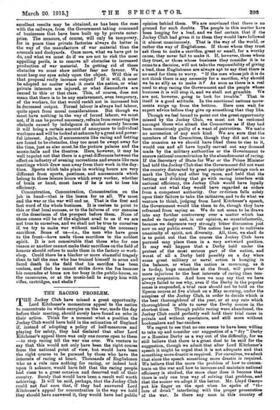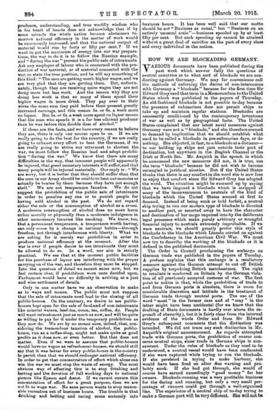tilt' RACING PROBLEM.
HE Jockey Club have missed a great opportunity. T Lord Kitchener's momentous appeal to the nation to concentrate its whole energies on the war, made the day before their meeting, should surely have found an echo in their action. Think for a moment what a position the Jockey Club would have held in the estimation of England if, instead of adopting a policy of half-measures and playing for safety, they had declared that after Lord Kitchener's appeal there was only one course open to them —to stop racing till the war was over. We venture to say that this would not only have been the right course from the national point of view, but would have been the right course to be pursued by those who have the interests of racing at heart. Thousands of Englishmen who as a rule care nothing for racing, or indeed look upon it askance, would have felt that the racing people had risen to a great occasion and deserved well of their country. Surely that would have been a result well worth achieving. It will be said, perhaps, that the Jockey Club could not feel sure that, if they had answered Lord Kitchener's appeal for concentration in the way we hold they should have answered it, they would have bad public opinion behind them. We are convinced that there is no ground for such doubts. The people in this matter have been longing for a lead, and we feel certain that if the Jockey Club had given it to them they would have followed it almost unanimously. That is the way of the world, or rather the way of Englishmen. If those whom they trust ask them to make a sacrifice, great or small, for a worthy cause, they never fail to make it. If. however, those whom they trust, or those whose business they consider it is to come to a decision, will not take the responsibility of giving a lead, then Englishmen are always apt to say that there is no need for them to worry. '• If the men whose job it is do not think there is any necessity for a sacrifice, why should we be so silly as to make it ? As soon as there is a real need to atop racing the Government and the people whose business it is will stop it, and we shall out grumble. We are not, however, going to look for trouble." That in itself is a good attitude. In the emotional nations move- ments surge up from the bottom. Here men wait foe expert advice before they give up something that they like.
Though we feel bound to point out the great opportunity missed by the Jockey Club, we must not be reckoned amongst those who attack the Committee as if they had been consciously guilty of a want of patriotism. We make no accusation of any such kind. We are sure that the members of the Committee, though they did not rise to the occasion as we should have liked them to rise to it, would one and all have loyally carried out any demand made by the military authorities or the Government to ensure national concentration by the abandonment of racing. If the Secretary of State for War or the Prime Minister had told the Jockey Club that the Government did not want the country distracted by great popular gatherings such as mark the Derby and other big races, and held that the betting and drinking that go with racing interfere with national efficiency, the Jockey Club would have loyally carried out what they would have regarded as orders from a competent authority. Our criticism falls solely upon their failure to take the initiative, and to do what we venture to think, judging from Lord Kitchener's speech, the Government would like them to do, though they have refrained from saying so. We do not mean to be drawn into any further controversy over a matter which has ended so tamely and, in our opinion, so unsatisfactorily, because we deprecate very strongly bitter discussion just now on any public event. The nation has gut to cultivate unanimity of spirit, not diversity. All, then, we shall do is to point out that the course the Jockey Club have pursued may place them in a very awkward position. It may well happen that a Derby bold under the protest of the most serious part of the nation, and wotat of all a Derby held possibly on a day when some great military or naval action is hanging in the balance, or when the nation is mourning, as it is to-day, huge casualties at the front, will prove far more injurious to the best interests of racing than tem- porary suspension. And here we may say that we have always failed to see why, even if the Derby in the popular sense is suspended, a trial race should not be bold on the Epsom course at five o'clock on a May morning, under the
auspices of the Jockey Club. in order to decide which is the best thoroughbred of the year, or at any rate which thoroughbred is able to cover the Derby course in the shortest time. Though public racing were abandoned, the Jockey Club could perfectly well hold their trial races in private and without spectators, and still more without bookmakers and bar-tenders.
We regret to see that no one seems to have been willing to take up and consider our suggestion of a " dry " Derby or a Russian Derby as a way out of the difficulty, for we still believe that there is a great deal to be said for the suggestion, though we admit that after Lord Kitchener. speech it might be urged that it is not adequate and that something more drastic is required. For ourselves, we admit that since the speech something more drastic is required. We believe that the more the problem of how to concen- trate on the war and bow to increase and maintain national efficiency is studied, the more clear does it become that
there is-only one true way of solving that problem, and
that the sooner we adopt it the better. Mr. Lloyd George put his finger on the spot when be spoke of "the
lure of drink" interfering with the proper prosecution of the war. Is there any man in this country of prudence, understanding, and true worldly wisdom who ID his heart of hearts does not acknowledge that if by Some miracle the whole nation became abstainers to- morrow national efficiency in the matter of work would be enormously increased, and that the national output of material would 'rise by forty or fifty per cent.? If we want to get the maximum of energy into our war prepara- tions, the way to do it is to follow the Russian example, and " during the war" prevent the public tale of intoxicants. Ask any employer of labour who is concerned with the pro- duction of war material, or of material connected with the war, to state the true position, and he will say something of this kind: "The men are getting much higher wages, and we are very glad that they are getting them. But, unfortu- nately, though they are receiving more wages they are not doing more but less work. And the reason why they are doing less work is that so many of them spend their higher wages in more drink. They pay over to their wives the same sum they paid before their present greatly increased earnings. and this means Is. or Se. a week more on liquor. But Is. or 6s. a week more spent on liquor means that the man who spends it is a far less efficient producer than he was before this double dose of alcohol."
If these are the facts, and we have every reason to believe they are, there is only one course open to us. If we are really going to do the best for the country, if we are really going to exhaust every effort to beat the Germane, if we are really going to strive our uttermost to shorten the war, we must follow the Russian lead and adopt prohibi- tion "during the war." We know that there are many difficulties in the way, that innocent people will apparently be injured, that great monetary interests will suffer,and that many people will he injured materially. Our reply is: We are sorry, but it is better that they should suffer than that the men in our Army should be unable to beat our enemies or actually be beaten by them because they have not enough shell." We are not temperance fanatics. We do not suggest the prohibition of the public sate of intoxicants in order to penalize any one or to punish people for having sold alcohol in the past. We do not regard either the sale or the consumption of alcohol as a crime. A moderate consumption of alcohol does no more harm either morally or physically than a moderate indulgence in other unnecessary luxuries like smoking. We know, too, that a permanent temperance, a temperance worth having, can only come by a change in national habits—through freedom, not through interference with liberty. What we are asking for is merely war prohibition in order to produce national efficiency at the moment. After the war is over if people desire to use intoxicants they must be allowed- to do so. In a word, our aim is strictly pra.cticaL We see that at the moment public facilities for the purchase of liquor are interfering with the proper carrying on of the war, and therefore they must be stopped. Into the question of detail we cannot enter now, but we feel certain that, if prohibition were once decided upon, Parliament would have no difficulty in arriving at a just and wise settlement of details.
Only in one matter have we an observation to make as to ways and means. The public must not suppose that the sale of intoxicants need lead to the closing of all public-houses. On the contrary, we desire to see public- houses kept open for the sale of food and of non-intoxicants like mineral waters, beef-tea, cocoa, tea, coffee, de. People will want refreshment just as much as now, and will be quite as willing to pay for it under the temporary prohibition as they now do. We are by no means sure, indeed, that, con- sidering•the tremendous taxation of alcohol, the public- house, run as a coffee-shop, might not make quite as good profits as it does now, or even better. But that does not matter. Even if we were to assume that public-houses would have no vogue as refresbinent-houses, we should still say that it was better for every public-bowie in the country to perish than that we should endanger national efficiency. In order to get that concentration of effort which alone can win the war we must stop the waste of energy. The most obvious way of effecting this is to stop drinking and betting and the devotion of full working days to national picnics like Epsom and Ascot. If we cannot ensure this concentration of effort for a great purpose, then we are not fit to wage war. No sane person wants to stop reason- able recreation out of business hours. The trouble is that drinking and betting and racing come seriously into
business hours. It hits been well said that our motto should be not "Business as usual," but "Business on an entirely unusual scale "=business speeded up by at least fifty per cent. But snob speeding up cannot be attained without a great deal of sacrifice on the part of every class and every individual in the nation.







































 Previous page
Previous page